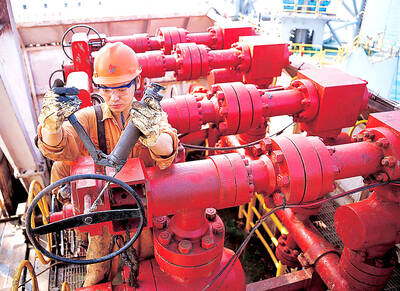Sun Yat-sen’s (孫逸仙) designation as the nation’s “founding father” should be dropped, Democratic Progressive Party Legislator Gao Jyh-peng (高志鵬) said yesterday, pledging to push for legislation to remove the legal requirement that Sun’s portrait be displayed in public buildings.
Gao said that Sun’s title as the nation’s “founding father” is a remnant of one-party rule under the Chinese Nationalist Party’s (KMT) authoritarian regime and ran against democratic principles.
Legal mentions of the designation are seen only in connection with the national flag, he said, citing the National Emblem and National Flag of the Republic of China Act (中華民國國徽國旗法) and the Oath Act (宣誓條例).
The National Emblem Act states that the national flag should be placed “above the portrait of the father of the nation” in government buildings, while the Oath Act mandates that officials taking the oath of office should face both the national flag and the “portrait of the father of the nation.”
While the flag is a symbol of the nation whose status is mandated in the Constitution, Sun’s status as “founding father” was crafted by Chiang Kai-shek (蔣介石) as a tool to justify the legitimacy of his regime, Gao said, questioning why leaders should be obligated to bow before something that has no relation to Taiwan’s modern democratic society.
While requirements mandating that portraits of Chiang and his son, former president Chiang Ching-kuo (蔣經國), be displayed in schools were abolished in 2002, the KMT had previously blocked legislation to drop requirements to display Sun’s portrait, Gao said.
Lee Hsiao-feng (李筱峰), a professor at National Taipei University of Education’s Graduate School of Taiwanese Culture, echoed Gao’s proposal, saying that Sun was only designated as the “founding father” in 1940 as part of an executive order intended to whitewash Chiang Kai-shek’s distortion of history and bolster his claim of being Sun’s successor.
While Sun made an undeniable contribution to the 1911 Xinhai Revolution that overthrew the Qing Dynasty, the revolution’s success also depended on many other people, Lee said, adding that Sun should be removed from the “cult of personality” built around him by Chiang Kai-shek.
Earlier this month, Kaohsiung Municipal Senior High School announced it would no longer make its students bow to portraits of Sun and the national flag in its end-of-semester ceremony.
Bowing three times to the flag and Sun’s portrait during school ceremonies has been a tradition for students in elementary, junior-high and high schools.
The school’s principal said the move was not politically motivated, while a student council called it a step toward depoliticizing the campus and achieving transitional justice.

The Chinese military has built landing bridge ships designed to expand its amphibious options for a potential assault on Taiwan, but their combat effectiveness is limited due to their high vulnerability, a defense expert said in an analysis published on Monday. Shen Ming-shih (沈明室), a research fellow at the Institute for National Defense and Security Research, said that the deployment of such vessels as part of the Chinese People’s Liberation Army (PLA) Navy’s East Sea Fleet signals a strong focus on Taiwan. However, the ships are highly vulnerable to precision strikes, which means they could be destroyed before they achieve their intended

About 4.2 million tourist arrivals were recorded in the first half of this year, a 10 percent increase from the same period last year, the Tourism Administration said yesterday. The growth continues to be consistent, with the fourth quarter of this year expected to be the peak in Taiwan, the agency said, adding that it plans to promote Taiwan overseas via partnerships and major events. From January to June, 9.14 million international departures were recorded from Taiwan, an 11 percent increase from the same period last year, with 3.3 million headed for Japan, 1.52 million for China and 832,962 to South Korea,

SOVEREIGNTY: The rigs show that Beijing ‘rejects Taiwan’s jurisdiction’ by building in areas where Taipei demands permission to build or alter installations Chinese oil rigs have been sighted just 26 nautical miles (42km), from Taiwan’s exclusive economic zone (EEZ) near Pratas Island (Dongsha Island, 東沙島), posing a threat to Taiwan’s sovereignty if left unchallenged, a brief published by the Jamestown Foundation on Tuesday said. Pratas Island, 444km from Kaohsiung, is northeast of the South China Sea and houses a Taiwanese garrison. The brief, titled “Rigging the Game: PRC Oil Structures Encroach on Taiwan’s Pratas Island” — referring to the People’s Republic of China — analyzed photographs and said that Beijing’s tools to pressure Taiwan now include oil rigs. “Oil rigs now constitute part of Beijing’s

The Taiwan Experience Education Program (TEEP) has funded short-term internships in Taiwan for more than 4,500 young people from more than 40 countries since 2015, with the goal of attracting and retaining international talent, the Ministry of Education said yesterday. Fifty-five colleges launched 514 projects this year, including in fields such as semiconductors, artificial intelligence, medicine and biotechnology, green energy, and sustainability, it said. The program provides research and practical internships in Taiwan for two to six months, and offers cultural exchange and networking opportunities, the ministry said. For example, National Formosa University’s Embedded System and Autopilot Laboratory developed two solar-powered drones in